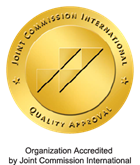
Breast Center
Breast cancer is now the most common type of cancer in women, with 1.3 million new cases a year worldwide. However, it is a fully curable disease, provided it is diagnosed early.
The Henry Dunant Hospital Breast Center provides comprehensive services related to both the diagnosis and treatment of breast cancer.
Activities
OBJECTIVE OF THE BREAST CENTER
The Center’s primary objective is the early diagnosis of breast cancer, as it can even lead to a complete cure of the disease.
The Breast Center is coordinated by breast surgeons. It is staffed by a highly trained and experienced medical staff, specialized in the diagnosis and treatment of breast cancer, in collaboration with all the appropriate medical departments and health professionals, for the optimal handling of cases.
WHEN SHOULD SCREENING MAMMOGRAPHY BE PERFORMED?
Early diagnosis is the most important weapon in the fight against breast cancer and is mainly achieved through self-examination, clinical examination by a qualified doctor and screening mammography.
Self-examination should be performed every month, 7-10 days after the start of the menstrual period and, in post-menopausal women, on the same day of each month, e.g. the 1st of each month.
The first ultrasound screening, accompanied by a clinical examination, should be done at 20-25 years. The first screening mammography should be done at the age of 35-39 years (reference mammogram for comparison).
Thereafter, annual screening should be carried out from the age of 40 years. Women who have a personal history or a first-degree relative with breast cancer should be screened earlier, depending on their doctor’s recommendation.
SERVICES OF THE BREAST CENTER
The Breast Center addresses each case comprehensively, undertaking everything from clinical examination, preoperative diagnosis and identification of lesions, to planning the necessary surgical treatment and postoperative care.
In collaboration with the Department of Medical Imaging and Interventional Radiology its framework of operation and services covers:
- Digital Mammography with a state-of-the-art digital mammography system, certified by EUREF (European Reference Organization).
- Breast Ultrasound - Elastography and ultrasound-guided biopsy.
- Stereotactic Biopsy, with the placement of a special hook wire to locate lesions.
- Magnetic Resonance Mammography (MRM), the newest method of breast imaging.
- CT scan to further investigate the disease.
- Bone Scintigraphy - Sentinel Lymph Node Scintigraphy with the Symbia Evo Excel γ-camera, the newest and most complete model of its class.
What is Breast Ultrasound - Elastography?
Digital mammography is considered the first-choice test in screening. However, 4-8% of breast neoplasms are not detected on mammography. At the Henry Dunant Hospital Center, the protocol we apply is a combination of digital mammography and breast ultrasound- elastography, as the combination of these two methods significantly increases the diagnostic accuracy of the examination. Each mammogram should be accompanied by a clinical examination (palpation) of the breasts, which should be performed by an experienced clinical mammologist.
What is Magnetic Resonance Mammography?
Magnetic resonance mammography is the newest imaging test, performed in cases where a diagnostic question remains after mammography and ultrasound. MRI is also the test of choice for the evaluation of implants.
COLLABORATION WITH OTHER SPECIALITIES
The Breast Center collaborates with all the appropriate medical departments of the Henry Dunant Hospital Center. In particular, it collaborates with:
- The Central Pathology and Cytology Laboratory, for the comprehensive study and documentation of the biological specifications of lesions.
- The Oncology Departments, the oncologists of which are involved in the decisions for preoperative and postoperative treatment and undertake all existing international treatment protocols.
- The Oncology Council, for a multidisciplinary and evidence-based personalized treatment.
- Specialized consultants - geneticists, to provide appropriate instructions to patients and their families.
- A Psychological Support Team, before and after surgery.
- Consultant radiotherapists, for evidence-based decisions about post-operative radiotherapy.
- The Physical Medicine and Rehabilitation Department, for post-operative support and guidance.
- Specialist plastic surgeons, to offer the possibility of any form of rehabilitation following mastectomy.
- The Gynaecology Clinic, for additional support and advice, in case of co-existing gynaecological problems.

